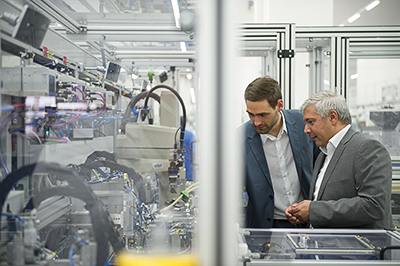Simatic Migration Services make machines and systems future proof

- Simple migration to pioneering Simatic technologies and the TIA Portal
- Extended machine lifespan and increased reliability
- Lower migration costs and minimum downtime during the implementation
- Partial and complete migration are both possible
Simatic Migration Services enable companies to migrate to the latest Simatic technologies. This makes their legacy automation systems future-proof, increases plant availability and extends machine lifespan. The services are designed for manufacturing customers in all discrete automation industries. With Simatic migrations services, customers can retain Siemens experts to perform the entire migration.
The quick and simple changeover can be achieved through standardized migration offerings, which range from consulting and conception, through the implementation, testing and commissioning to the handover of the new system, including technical training for the personnel. Precise planning minimizes both the risks of migration and the scheduled downtime for the implementation.
The services can be tailored flexibly to match a company's requirements. Both partial and complete migration of systems and machines are possible. Within the scope of the service, Siemens experts support users, in particular with the migration of application software from Step 7, Protool or WinCC Flexible projects to TIA Portal projects.
If required, frequency converters and Motion Control systems can also be modernized. Companies that take advantage of Simatic Migration Services benefit from a smooth migration, long-term spare part availability, integrated diagnostic functions that speed up fault correction, and reduced downtimes.
Modern Simatic technology and network infrastructures also enable efficient interoperability of all components and greatest transparency across all levels: relevant information is available anywhere in the plant at any time. This increases the availability of machines and systems, as well as making them future-proof.
For further information, please see: www.siemens.com/fa-migration
Siemens AG (Berlin and Munich) is a global technology powerhouse that has stood for engineering excellence, innovation, quality, reliability and internationality for more than 165 years. The company is active in more than 200 countries, focusing on the areas of electrification, automation and digitalization. One of the world's largest producers of energy-efficient, resource-saving technologies, Siemens is No. 1 in offshore wind turbine construction, a leading supplier of combined cycle turbines for power generation, a major provider of power transmission solutions and a pioneer in infrastructure solutions as well as automation, drive and software solutions for industry. The company is also a leading provider of medical imaging equipment – such as computed tomography and magnetic resonance imaging systems – and a leader in laboratory diagnostics as well as clinical IT. In fiscal 2014, which ended on September 30, 2014, Siemens generated revenue from continuing operations of €71.9 billion and net income of €5.5 billion. At the end of September 2014, the company had around 343,000 employees worldwide.
Further information is available on the Internet at www.siemens.com
Reference Number: PR2015100025DFEN
Contact
Mr. David Petry
Digital Factory Division
Siemens AG
Schuhstr. 60
91052 Erlangen
Germany
Tel: +49 (913) 172-6616
david.petry@siemens.com
Media Contact
All latest news from the category: Trade Fair News
Newest articles

Bringing bio-inspired robots to life
Nebraska researcher Eric Markvicka gets NSF CAREER Award to pursue manufacture of novel materials for soft robotics and stretchable electronics. Engineers are increasingly eager to develop robots that mimic the…

Bella moths use poison to attract mates
Scientists are closer to finding out how. Pyrrolizidine alkaloids are as bitter and toxic as they are hard to pronounce. They’re produced by several different types of plants and are…

AI tool creates ‘synthetic’ images of cells
…for enhanced microscopy analysis. Observing individual cells through microscopes can reveal a range of important cell biological phenomena that frequently play a role in human diseases, but the process of…





















